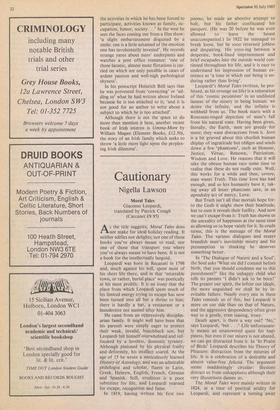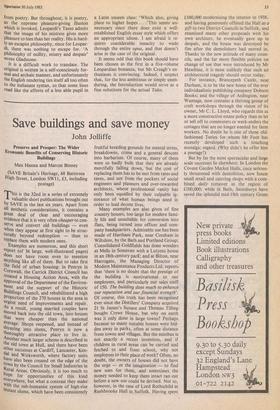Cautionary
Nigella Lawson
Moral Tales Giacomo Leopardi, translated by Patrick Creagh (Carcanet £9.95)
As the title suggests, Moral Tales does not make for ideal holiday reading. It neither edifies nor delights; not one of those books you've always meant to read, nor one of those that transport you where you've always meant to have been. It is not a book for the intellectually languid.
Leopardi was born in Recanati in 1798 and, much against his will, spent most of his short life there, and in that `miserable town, or rather, burial place' was poetically at his most prolific. It is an irony that the place from which Leopardi spent much of his limited energy trying to escape has now been turned into all but a shrine to him; there is hardly a bar, a restaurant or a launderette not named after him.
He came from an oppressively disciplin- arian family. It might well have been that his parentt were simply eager to protect their weak, invalid, hunchback son, but Leopardi felt himself overwhelmed and suf- focated by a loveless, domestic tyranny. Although pinioned by his physical frailty and deformity, his intellect soared. At the age of 15 he wrote a meticulously learned History of Astrology, and was an admirable philologist and scholar, fluent in Latin, Greek, Hebrew, English, French, German and Spanish. Still, erudition is a poor substitute for life, and Leopardi yearned for escape, recognition and fame.
In 1819, having written his first two poems, he made an abortive attempt to bolt, but his father confiscated his passport. (He was 20 before he was even allowed to leave the house unaccompanied.) In 1822 he managed to break loose, but he soon•returned jobless and despairing. His yoyo-ing between a desperate, book-lined imprisonment and brief escapades into the outside world con- tinued throughout his life, and it is easy to understand his impression of human ex- istence as `a time in which our being is en- during rather than living'.
Leopardi's Moral Tales (written, he pro- fessed,
as his revenge on life) is a reiteration of this 'cosmic pessimism' in an undiluted lament of the misery in being human: we desire the infinite, and the infinite is withheld From us. The book starts with a Rousseau-tinged depiction of man's fall from his natural state. Having been given, literally, the Earth, men are greedy for more; they want distractions from it. Jove is a bit grieved about this churlish human display of ingratitude but obliges and sends down a few 'phantoms', such as Honour, Justice, Virtue, Renown, Patriotism, Wisdom and Love. He reasons that it will take the obtuse human race some time to realise that these do not realLy exist. Well, this works for a while and then, orrore, man wants Truth. This time Jove has had enough, and so lets humanity have it, tak- ing away all lesser phantoms save, in an agrodolce act of mercy, Love.
But Truth isn't all that mortals hope for: to the Gods it might show their beatitude, but to men it reveals their futility. And now we can't escape from it: Truth has shown us the unreality of happiness at the same time as allowing us to hope vainly for it. In crude terms, this is the message of the Moral Tales. The various dialogues and essays brandish man's inevitable misery and his presumption in thinking he deserves something better,
In 'The Dialogue of Nature and a Soul', the Soul asks `What sin did I commit before birth, that you should condemn me to this punishment?' like the unhappy child who tells its parents didn't ask to be born!' The greater our spirit, the loftier our ideals, the more anguished we shall be by in- evitable failure. Nearly every one in these Tales reminds us of this, but Leopardi is more on our side than on that of Nature, and the aggressive despondency often gives way to a gentle, even teasing, irony.
Death apart, is there a way out? `No,' says Leopardi, 'but . . .' Life unfortunate- ly means an unanswered quest for hap- piness, but even if our misery is not abated, we can get distracted from it. In 'In Praise of Birds' Leopardi describes his Theory of Pleasure: distraction from the miseries of life. It is a celebration of a desirable and almost value-free felicita. The argument seems maddeningly circular: illusions distract us from unhappiness although their very illusoriness damns us.
The Moral Tales were mainly written in 1824, at a time of poetical aridity for Leopardi, and represent a turning away from poetry. But throughout, it is poetry, as the supreme pleasure-giving illusion which is invoked. Leopardi's Tasso admits that the image of his mistress gives more pleasure to him than her reality. His is hard- ly an escapist philosophy, since for Leopar- di, there was nothing to escape for. 'A philosophy of nullity, misery and despair' wrote Gladstone.
It is a difficult work to translate. The original is written in a self-consciously for- mal and archaic manner, and unfortunately the English rendering ties itself all too often to the italianate syntax, so that some lines read like the efforts of a less able pupil in
a Latin unseen class: 'Which also, giving place to higher hopes . . .'This seems un- necessary since there does exist a well- established English essay style which offers an appropriate idiom. I am afraid it re- quires considerable tenacity to wade through the entire opus, and that doesn't arise in the case of the original.
It seems odd that this book should have been chosen as the first in a five-volume Leopardian bonanza, but Mr. Creagh's en- thusiasm is convincing. Indeed, I suspect that, for the less ambitious or simply unen- during, the Introduction would serve as a fine substitute for the actual Tales.







































 Previous page
Previous page